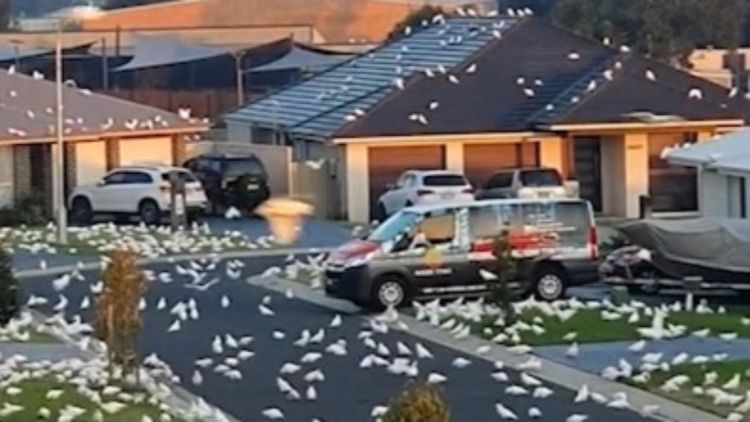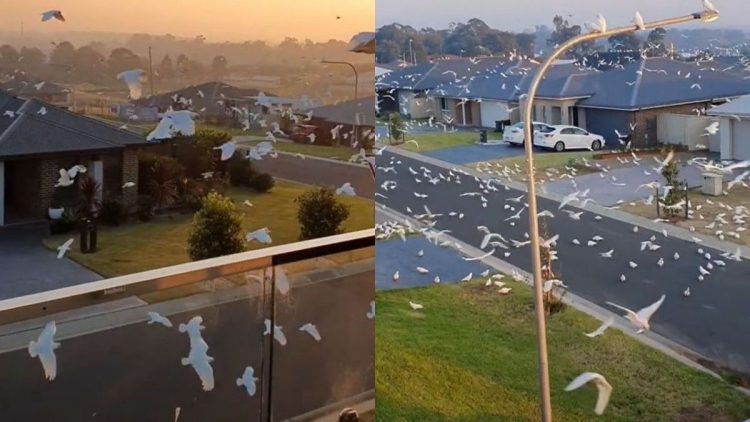The New South Wales resort town of Nowra was recently invades by thousands of corellas, a subgenus of white cockatoo, which made it look like the set of an Alfred Hitchcock movie.
Photos and videos of white birds gathered on the streets of Nowra have been doing the rounds online for about a week.
The corellas can be seen hanging from lamp posts, converging on people’s lawns, roofs and digging trough their trash in search of food, and making an infernal ruckus.
It’s definitely not something you see everyday, but even though media outlets around the world have described the footage as somewhat of a freak occurrence, for the people of Nowra, the events captured on camera recently on Jindalee Crescent street have become quite common.
For years, people here have been sharing the town with corellas, and although many of them hate the birds, there’s not a lot they can do about it.My Rhythm and My Blues: D.C. Young Fly

“They’re supposed to be a pest, and they do a lot of destruction to the trees,” one Nowra woman told the Sidney Morning Herald. “I’m always sweeping feathers away.”
The loud squawking and the droppings they leave everywhere aren’t winning the corellas any human fans either, but they don’t seem to care very much, and because they are a protected species, annoyed locals have very few options of dealing with the birds.

Driving or walking through Nowra, it’s not uncommon to see flocks of corellas perched on power lines, parked cars and billboards. They don’t shy away from rolling on people’s lawns, scavenging for food in their trash, or sliding down on their roofs for fun, either. And every once in a while they will carry out a massive “invasion” like the one recently caught on camera.
Corellas’ takeover of Nowra has been a long time coming. In fact, experts have been warning about it for years. You see, these birds are not dumb, some claim that they have the intellect of an average two-year-old, so they quickly figured out that moving into a cozy man-made from the semi-arid wilderness of New South Wales was the smart thing to do. They hadn’t been seen in urban areas before the 1950s, and now they are everywhere.
“We have created a perfect habitat for little corellas and they are taking us up on the offer,” academics at the University of South Australia wrote in a 2018 report, adding that urban planning was the biggest problem. The wide-open lawns of Nowra skirted by tall trees and an easily-accessible water source make the perfect habitat for the white cockatoos.
According to 9News, large flocks of corellas gather on the streets of Nowra every single day, so it’s safe to say that the locals’ problems with the birds are only getting worse, and there is very little they can do about it.
Apparently, corellas have become a nuisance even in larger urban centers like Melbourne and Adelaide. Still, it’s a lot better than having your town invaded by giant flying foxes, I guess…
Latest Stories
-
Central Region PURC assures residents of constant water, power supply during yuletide
35 seconds -
Election victory not licence to misbehave – Police to youth
2 minutes -
GPL 2024/2025: Nations thrash struggling Legon Cities
5 minutes -
Electoral offences have no expiry date, accountability is inevitable – Fifi Kwetey
5 minutes -
Ghanaians to enjoy reliable electricity this Christmas – ECG promises
12 minutes -
Police deny reports of election-related violence in Nsawam Adoagyiri
16 minutes -
‘We’re not brothers; we’ll show you where power lies’ – Dafeamekpor to Afenyo-Markin
20 minutes -
EPA says lead-based paints are dangerous to health, calls for safer alternatives
2 hours -
Queenmother calls on President-elect Mahama to appoint more women in his government
4 hours -
Atletico Madrid beat Barcelona to go top of La Liga
4 hours -
Usyk breaks Fury’s heart with points win in rematch
5 hours -
Ghana-Russia Centre to run Russian language courses in Ghana
10 hours -
The Hidden Costs of Hunger: How food insecurity undermines mental and physical health in the U.S.
11 hours -
18plus4NDC marks 3rd anniversary with victory celebration in Accra
13 hours -
CREMA workshop highlights collaborative efforts to sustain Akata Lagoon
13 hours

